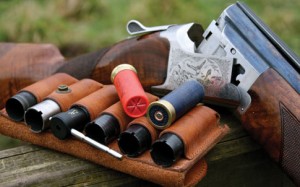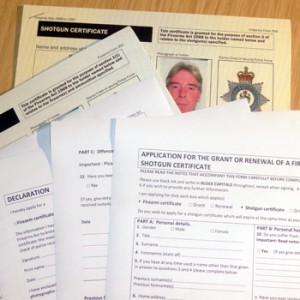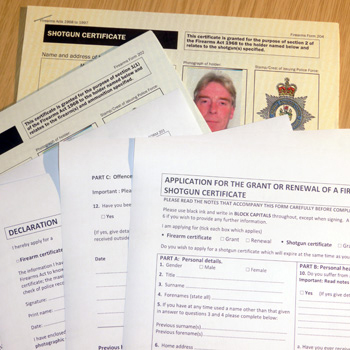 THE UK’s largest shooting organisation claims the time taken for firearms licensing is a postcode lottery after compiling a national performance database which shows as much as a 28-fold difference between police forces.
THE UK’s largest shooting organisation claims the time taken for firearms licensing is a postcode lottery after compiling a national performance database which shows as much as a 28-fold difference between police forces.
The inconsistency of service has been highlighted by a ground-breaking BASC study which found that to renew a shotgun certificate in Suffolk can take just eight days but in Kent it could take 225 days. Applicants can expect to wait the best part of a year for a firearm certificate grant in Essex although it will be delivered in under a month in Leicestershire.
BASC’s research shows the mean average for a section 1 grant to be 91 days; 88 days for a section 2 grant; 70 days for a section 1 renewal; 67 days for a section 2 renewal; and 26 days to issue a variation.
Bill Harriman, BASC’s director of firearms, said: “The inconsistency of service is of significant concern. Processing times are a complete postcode lottery from one police force to the next.”
BASC set out to build a national firearms licensing performance database covering every police force in England and Wales after being told that neither individual police forces nor the Home Office routinely publish such performance data.
Forty-three police forces were contacted and those who failed to provide information were issued Freedom of Information Act requests; some have still not given the information despite their statutory obligation to do so.
BASC has ranked average processing times between forces using a traffic light system. Figures (as of 2nd March 2017) indicate the average number of calendar days taken to process each application type. Colours categorise relative performance – with green representing high relative performance, yellow average relative performance and red relatively low performance.  “N/A” may mean the force had the information but refused to answer, that it isn’t recording all data across the parameter, or that it records the information in an inaccessible way such as holding individual paper records.
“N/A” may mean the force had the information but refused to answer, that it isn’t recording all data across the parameter, or that it records the information in an inaccessible way such as holding individual paper records.
BASC’s full-time specialist firearms team dealt with more than 10,000 calls and queries last year – its busiest year on record – and delays in the licensing process were undoubtedly the biggest concern for members.
BASC has written to Police and Crime Commissioners to outline the findings of the research and will also ask the national firearms lead – Assistant Chief Constable Dave Orford – to consider ways of bringing about improvements in the worst-performing forces.
The association will also ask the Home Office to collate and publish licensing performance data on a quarterly basis as part of an ongoing system of monitoring and intervention.
Bill Harriman added: “In the absence of data from the Home Office and individual police forces, the aim of this research was to establish a baseline of licensing performance.
“Our firearms team is told every day of anecdotal evidence which suggest some forces are light years ahead of others in how efficiently they process applications. Now we have figures to back the groundswell of opinion that many people within the shooting community are being let down depending on where in the country they live.
“This evidence-based process now allows us to publicly identify forces at either end of the performance spectrum. Clearly, the best performing police forces can show the worst forces the way to improve.
“It is in the interests of public safety for the licensing process to work as efficiently as possible. Applicants and certificate holders pay for the service and have a right to expect that service to be as quick and efficient as it can be.
“It is simply not acceptable that for example, while one force can take eight days to renew a shotgun certificate, another can take up to 31 weeks more to complete the same process. That suggests a serious failure in their procedures and is a risk to public safety.”
BASC sought to establish lines of communication with the licensing portfolio holder of each police force so that deficiencies could be brought to their attention and improvements encouraged.
The association also wanted to uncover how long each force was taking on average to grant and renew both section 1 and 2 certificates, issue variations, process transaction notifications and conduct suitability assessments following an incident.
Most forces either did not have, or refused to supply, information on suitability assessments following an incident involving a certificate holder. Based on the information received average processing times between forces ranged from nine to 56 days.
Only 19 forces provided information on transaction notifications, with average processing times ranging hugely from one to 70 days.
Transaction notification processing delays are of particular concern to BASC as there is a potential public safety risk. Firearm holders are required to notify police within seven days of a change of custody but this obligation is not reciprocated by the licensing authority. BASC believes the same public safety reasons for needing to receive the information promptly also apply to needing to process it promptly.
[box]
BASC’s criticism of firearms licensing is not new and many forces are continuing to deliver a sub-standard service despite previous calls to improve.
BASC chairman Peter Glenser, a barrister specialising in firearms law, said: “BASC will now use the database in a campaign directed at Assistant Chief Constable Dave Orford, the national firearms lead, and Police and Crime Commissioners in an effort to bring about the improvements that many forces are unwilling to institute of their own accord.
“We believe this kind of licensing performance data should be collated and published on a quarterly basis by the Home Office to facilitate an ongoing system of monitoring and, where necessary, intervention.
“Inconsistent firearms licensing services and prolonged delays are unacceptable, especially given the hike in fees in 2016 – an increase that saw no corresponding improvement in service.”
AVERAGE CALENDAR DAYS TAKEN TO PROCESS APPLICATIONS
|
Police force |
FAC Grant |
STG Grant |
FAC Renewal |
STG Renewal |
Variation |
|
Avon & Somerset Constabulary |
n/a |
n/a |
n/a |
n/a |
n/a |
|
Bedfordshire Police |
60 |
61 |
42 |
33 |
7 |
|
Cambridgshire Constabulary |
35 |
34 |
29 |
25 |
14 |
|
Cheshire Constabulary |
81 |
31 |
78 |
39 |
10 |
|
City of London Police |
n/a |
n/a |
n/a |
n/a |
n/a |
|
Cleveland Police |
n/a |
n/a |
n/a |
n/a |
n/a |
|
Cumbria |
168 |
168 |
168 |
168 |
35 |
|
Derbyshire Constabulary |
65 |
69 |
43 |
40 |
37 |
|
Devon & Cornwall Police |
89 |
85 |
50 |
47 |
n/a |
|
Dorset Police |
91 |
102 |
74 |
73 |
n/a |
|
Durham Constabulary |
38 |
37 |
39 |
39 |
1 |
|
Dyfed-Powys Police |
76 |
59 |
73 |
40 |
16 |
|
Essex Police |
222 |
258 |
134 |
210 |
27 |
|
Gloucestershire Police |
87 |
71 |
83 |
74 |
26 |
|
Greater Manchester Police |
102 |
99 |
143 |
151 |
99 |
|
Gwent Police |
68 |
49 |
55 |
46 |
26 |
|
Hampshire Constabulary |
185 |
183 |
77 |
74 |
91 |
|
Hertfordshire Constabulary |
51 |
51 |
30 |
28 |
10 |
|
Humberside Police |
89 |
87 |
55 |
50 |
18 |
|
Kent Police |
171 |
179 |
122 |
225 |
69 |
|
Lancashire Constabulary |
195 |
195 |
45 |
45 |
68 |
|
Leicestershire Police |
23 |
20 |
18 |
12 |
5 |
|
Lincolnshire Police |
120 |
130 |
81 |
62 |
36 |
|
Merseyside Police |
61 |
66 |
67 |
60 |
21 |
|
Metropolitan Police Service |
52 |
45 |
39 |
34 |
13 |
|
Norfolk Constabulary |
38 |
38 |
18 |
10 |
13 |
|
North Wales Police |
75 |
68 |
60 |
42 |
29 |
|
North Yorkshire Police |
59 |
67 |
19 |
19 |
n/a |
|
Northampton Police |
60 |
68 |
33 |
26 |
50 |
|
Northumbria Police |
37 |
42 |
22 |
23 |
3 |
|
Nottinghamshire Police |
86 |
93 |
75 |
54 |
23 |
|
South Wales Police |
93 |
69 |
86 |
70 |
n/a |
|
South Yorkshire Police |
105 |
109 |
77 |
68 |
14 |
|
Staffordshire Police |
73 |
73 |
107 |
93 |
13 |
|
Suffolk Constabulary |
24 |
23 |
26 |
8 |
9 |
|
Surrey Police |
43 |
53 |
32 |
33 |
n/a |
|
Sussex Police |
38 |
35 |
28 |
26 |
7 |
|
Thames Valley Police |
128 |
131 |
67 |
116 |
27 |
|
Warwickshire Police |
186 |
178 |
165 |
143 |
51 |
|
West Mercia Police |
189 |
144 |
169 |
141 |
54 |
|
West Midland Police |
92 |
95 |
113 |
93 |
21 |
|
West Yorkshire Police |
n/a |
n/a |
n/a |
n/a |
n/a |
|
Wiltshire Police |
45 |
48 |
40 |
36 |
7 |
